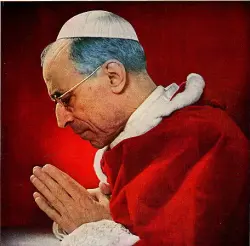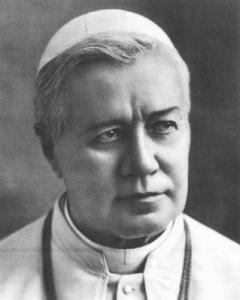The Actor, The Heroin, And The Saint
Do you not know that the unrighteous will not inherit the kingdom of God? Do not be deceived; neither the immoral, nor idolaters, nor adulterers, nor sexual perverts, nor thieves, nor the greedy, nor drunkards, nor revilers, nor robbers will inherit the kingdom of God.1Co 6:10
The sad – though self-inflicted; just so we do not get into the whiny V II “tambourine mode” – death of the great actor Philip Seymour Hofmann should, perhaps, be cause for a couple of politically incorrect and very un-V II reflections to the best of my ability. Some of you will be grated by them. So be it. I don't write this blog in order not to grate anyone. Actually, I write it in order to grate the one or other among them. I find this not only sound Catholicism, but even charitable. Imagine that.
Unless the New Testament has deceived us this last 2000 years; or we have not been able to read for the same amount of time; or the Holy Ghost has miraculously changed His mind upon witnessing the wonder of V II, people who gravely poison themselves will not inherit the kingdom of God. I will not insult your intelligence explaining to you that what is true for the drukard is also true for the heroin addict, though St. Paul could not have mentioned heroin. By the way, notice how uncharitable St. Paul is in using this word, “drunkard”. What a self- righteous, judgmental hater, nicht wahr?…
Still, like every other grave matter, the passage mentioned above must be read in the light of Church teaching: the mortal sin entails not only a behaviour that can be considered “grievous matter” (Baltimore catechism), but the subjective elements must be present; to put it again with the Baltimore Catechism: sufficient reflection, and full consent of the will.
Now, no one of us can know what went through the mind of Mr Seymour Hoffman as he was injecting himself the fix that was to prove fatal to him; but in the realm of those sober observations we are rather obliged to make on this earth – if we care for our salvation, at least; and if we do not think God will “slap us on the wrist” at worst – the full consent of the will is, reasonably, not present in the heroin addict as to what concerns his very act of injecting himself the fix; at that point, Seymour Hoffman was, reasonably, not able to take a deliberate, free decision to take the heroin; rather, one can reasonably say that very probably such a biological compulsion would have acted on him, that it is at least sound to assume the man was compelled by his altered biological functions to act against his better judgment; so that, to say it with the immortal words of St. Paul, he “did the very thing he hated”.
The V II crowd would probably stop here; declare Seymour Hofmann happily in Purgatory; or possibly even decide he had his purgatory here on earth – a fashionable, often-used statement nowadays, as it allows one to happily remove the reality of purgatory without denying its existence – so no need for that, thank you very much.
I do not think it's so easy.
Very few people (fairly: only the very wicked ones) go through life with the cold-blooded intention of being evil. If God had meant hell only for those the entire Gospel would make no sense, because Jesus very obviously threatens with hell at a far less extreme – or at least: less extreme when measured with the usual human metre – stage of wickedness. For example, not believing in Him is enough, even if one is the most excellent father, husband, and chairman of the local “save the hearth” group. Sin is offence made to God. Taking hard drugs, or drinking oneself to stupor, is a very serious offence. No amount of pussyfooting around facts will ever get rid of this simple truth.
No. If Christianity is to make sense, and if we want to be realistic about our own situation, we must soberly realise that damnation is a concrete possibility for everyone of us, the loving and nice members of our community always ready to defend the Amazonian Forest from imminent destruction, and very concerned about the fate of the red squirrel.
This means that “being a drug addict” is just not enough to get away with it. In the same way that if I fill myself with cocaine before robbing a bank and then kill the teller in my coke-induced madness I am responsible *for having put myself in the position to kill the teller*, the question arises how Seymour Hoffman – and all those who kill themselves with the nail, or with the bottle, or playing russian roulette because of their addiction to bet and danger – can get away with having put himself in that situation of addiction in the first place.
This must be, I am afraid, a very sobering thought, as whilst people can and do at times slip into alcoholism a bit at a time, without noticing and without being able to recognise the point at which the pathology has set in until it is very late, the same cannot be said of substances whose assumption is punished by the law with several years of jail, not to be obtained at all without a deliberate effort, and of whom a child of eleven must know, unless he is gravely retarded, what he is doing.
Again, whilst drunkenness can be involuntary if one does not realise what effect the drink is going to have on him, heroin intake must perforce be a mortal sin in that it requires a Francis-like fantasy to think it can be, in the usual cases, taken without deliberate intent (there are extreme exceptions, of course: I read once Hermann Goering became an addict because they gave him too much drugs in the hospital whilst curing him).
As always in these complex cases, the greatest thinker of all times helps us greatly at Q150 of the summa theologica, answering all our doubts as he deals with drunkenness. As to whether drunkenness (and we can say: deliberate heroin taking) is a mortal sin, the Angelic Doctor states:
“it may happen that a man is well aware that the drink is immoderate and intoxicating, and yet he would rather be drunk than abstain from drink. Such a man is a drunkard properly speaking, because morals take their species not from things that occur accidentally and beside the intention, but from that which is directly intended. On this way drunkenness is a mortal sin, because then a man willingly and knowingly deprives himself of the use of reason, whereby he performs virtuous deeds and avoids sin, and thus he sins mortally by running the risk of falling into sin.”
Note here that drunkenness deliberately induced is a mortal sin qua drunkenness, not only if a further sin ensues. It would be a mortal sin even if the man would get drunk locked alone in a jail cell. Or would inject heroin in himself in his own bathroom, whilst alone at home.
Therefore, we know that deliberate drunkenness (and by logical extension: heroin taking) is a mortal sin by itself, and that one cannot reasonably become a heroin addict without committing a series of deliberate mortal sins; until at some point the deliberation is diminished, and in the end probably ceases, because an addiction has now taken roots which make the deliberate decision not to take drugs an extremely difficult one. Whilst at this point the sin committed whilst “under the influence” can be diminished (and St. Thomas states as much, making the example of Lot), the mortal sin that originated the subsequent sins clearly remains (Article 4).
I can, therefore, not buy the idea that Seymour Hoffman – and clearly everyone who kills himself by drug taking, or by drinking – “will be just fine” because “he was addicted”. Rather, unless I want to sink in a lake of molasses I must admit that he must have been in mortal sin several times as he was in the process of becoming an addict; mortal sins which – unless repented by a suitable perfect contrition before death, or valid confession at any point – would merit him hell.
A different reasoning could also be made as to what Seymour Hoffman's – and every drug addict's, and every drunkard's – attitude towards his addiction was. Did he have a firm resolution not to sin anymore, expressed to a priest in a good confession? Now of course a firm resolution does not mean one will be freed from the addiction, but as far as I know it is simply a requirement of our religion *that the firm resolution be there*. Again, we must soberly observe reality and decide that unless Seymour Hoffman was a *practicing* Catholic – of which I have no information, but is to be hoped – his confessing his sin and firm resolution of amendment was, reasonably, not there.
Is, then, the man very probably screwed? Thankfully for him and all of us, it does not have to be so. By the grace of God, things are not so black and white that we can say that either he went to confession, or he went to hell. We cannot know whether on that day – and certainly not by coincidence; because if it has happened, it was Divine Providence that ordered things so, and gave him the efficacious grace to do so – the man managed a perfect contrition, and gave way to his addiction in a state of diminished guilt, such that the perfect contrition would procure him absolution from his past mortal sins and the now present addiction would (confront Thomas above) allow him to escape from a mortal sin for his last and fateful act.
What do we, therefore, conclude from all this? In my eyes, we cannot but conclude the following:
1. that we cannot simply say that the addiction excuses from the mortal sin; behind the addiction must reasonably stay several mortal sins: mortal sins which many people nowadays do not care to entrust to the mercy of the Lord in a good confession, thus remaining in mortal sin whatever the goodism of the day may suggest.
2. that it is foolish for the addict to remain in his state of mortal sin without a firm resolve of improvement, as this would make his confession's validity questionable at the very least. One thinks of John Belushi – another great actor I really liked and still miss after all these years – and, well, shudders. There can be no doubt that all those who are near such a person, and a priest if he has the fortune of having such a one near him, should feel the need to help him to such a firm resolution of amendment; in which, by the way, is the true charity.
3. that we are always allowed to hope, because it can always be that, unknown to the world, the Seymour Hoffman of the day managed that all-important perfect contrition. As long as there's life there's hope, as they say, and the other one about the ways of the Lord certainly comes to mind.
I would also add this: that a society in which one dies of drug addiction and only a tiny minority of people – who are then accused of being “uncharitable”, of course – wonders in a serious way about what it is with salvation in such cases is a society that has almost completely lost the fear of the Lord and every Christian common sense, and has managed to, well, drug itself with political correctness and the all pervading “niceness” of our times to the point of removing the reality of judgment from their consciousness even when events happen which, in fact, scream alarm. No: the V II crowd will in this case simply remove the problem by saying the fashionable “who are we to judge” or by creating a fantasy Christianity in which neither the immoral, nor idolaters, nor adulterers, nor sexual perverts, nor thieves, nor the greedy, nor drunkards, nor revilers, nor robbers will be denied the kingdom of God no matter what, because He is so merciful. These people endanger their own salvation, and the salvation of those who listen to them.
If there's one thing for which we should pray, it is the grace of final perseverance. A grace I wish to Seymour Hoffman, to John Belushi, to Amy Winehouse, and – heck – even to Jim Morrison: and to all drunkards and drug addicts of this world; for whom we must pray, without wishy-washing the simple fact that they are – as the saints used to say before the world became so much better than them – drunkards, or today's drug addicts; and immortal souls, in clear danger of damnation and therefore, again, clearly in need of our prayers.
Mundabor
Posted on February 10, 2014, in Catholicism, Conservative Catholicism, Traditional Catholicism and tagged Damnation, Drug addicts, Philip Seymour Hoffman, Salvation. Bookmark the permalink. 7 Comments.





















Thanks for this Mundy:+) From what I could glean from his story, he supposedly saw the light in his early 20’s and stopped the drugs. Sadly he probably trusted mainstream doctors to help him with the damage from the drugs only to be given more drugs (prescription) that ended up causing infinite more damage. Prescription drugs are very harmful and dangerous but here in the US the docs tell us they are harmless and give them out like candy. In the US, legal drugs cause much more death and damage then the illegal ones. And it’s the doctors in white coats, Pharma and the FDA who are now our dealers. I can only imagine the he** PSH was experiencing from the iotragenic damage from the pharmaceuticals given to him by the doctors and medical system he trusted to have sought out relief from something he ran from half a lifetime ago. Yes, let us hope he was contrite before sticking himself and pray for him…he needs it. God bless~
Wasn’t he found with 70 doses of heroin? Prescription?
I know that is a problem, by I was told many bully their doctor into prescribing them.
I do not live there, mind.
M
One cannot compare heroin with alcohol. Apples and oranges. Heroin, if legal and pure, does not cause damage to any organ of the body, and temperate use can improve one’s ability at nearly anything, except sports. Alcohol, however, quickly deprives the drinker of inhibitions and physical co-ordination and interferes with any activity. Alcohol was prohibited by man’s law many times in history. If not for the unjust war on drug users, one could inject heroin 3 times a day for 50 years to no ill effect. There is simply no similarity between the sloppiness of the “drunkard” and the cool calm of the opiate user. The addict can only be detected by his behaviour when he has been without medication for a certain amount of time. Opium certainly was prevalent and available in the Levant at the time of Christ, yet no mention of it appears in the Old or New Testament. Perhaps it was simply taken for granted as a merciful painkiller, whether the pain be physical or emotional. If you haven’t been there, you can’t know. BTW, are you a convert from Protestantism?
I publish this just to give to my readers one example among very many of the kind of excrements landing on my comment box.
No, it’s not fun. It also takes away a lot of time.
M
For 42 years as a nurse in Emergency and trauma, I saw the results of the poisons such as Heroin and cocaine which actually does kill and I have seen many patients enter DOA and was assured by the person who gave them the killing dose that it was their first time and that that was probably why they died. Not enough tolerance for the dose given. So wasteful and stupid it makes one cry with impotent rage. Noone in er escapes this.
Thank you for this. We are all afflicted by addictions, even to the internet, that stupefy our minds and numb our resolve. And it’s not so easy to give up a habit, even cigarettes, coffee or chocolate. Practicing mortification and giving up things that aren’t harmful just to practice resistance is considered medieval nowadays (who wears hair shirts anymore?) but these are practices that can help us in a modern society where we are inundated all day long with messages pushing luxury, indulgence and pampering.
If I recall correctly, it was mentioned in the article that there were numerous prescription drugs found as well as all of those vials of heroin. Iotregenic damage done by supposed legal prescription makes heroin look like a Hershey bar. And yes, there are some who bully docs for their drugs but countless others whose lives were destroyed by doctors/pharma/FDA who kept on telling them the lie that they “needed” the drug…I am one of them and I belong to communities of people who have had this done to them too. Real problem here in the US…especially since we are trained to see doctors as “gods” (white coats anyone?). But thanks to survivors, the word is getting out and the US won’t be so pill trusting anymore:+) I’m sure the fuller story will emerge one day. God bless you Mundy:+)